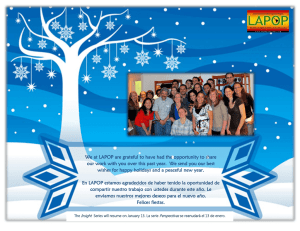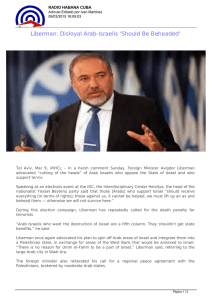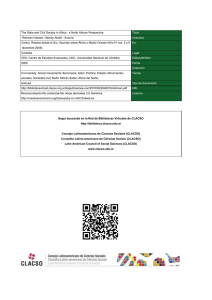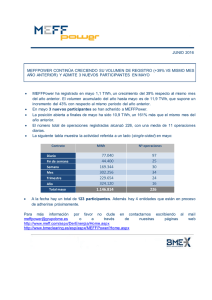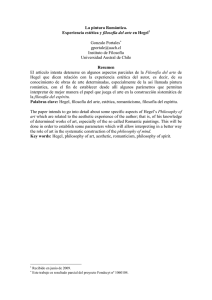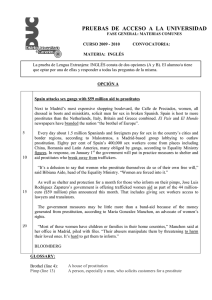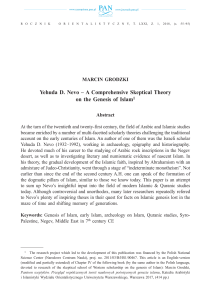Arab Revolution versus Western Democracy? About riots
Anuncio
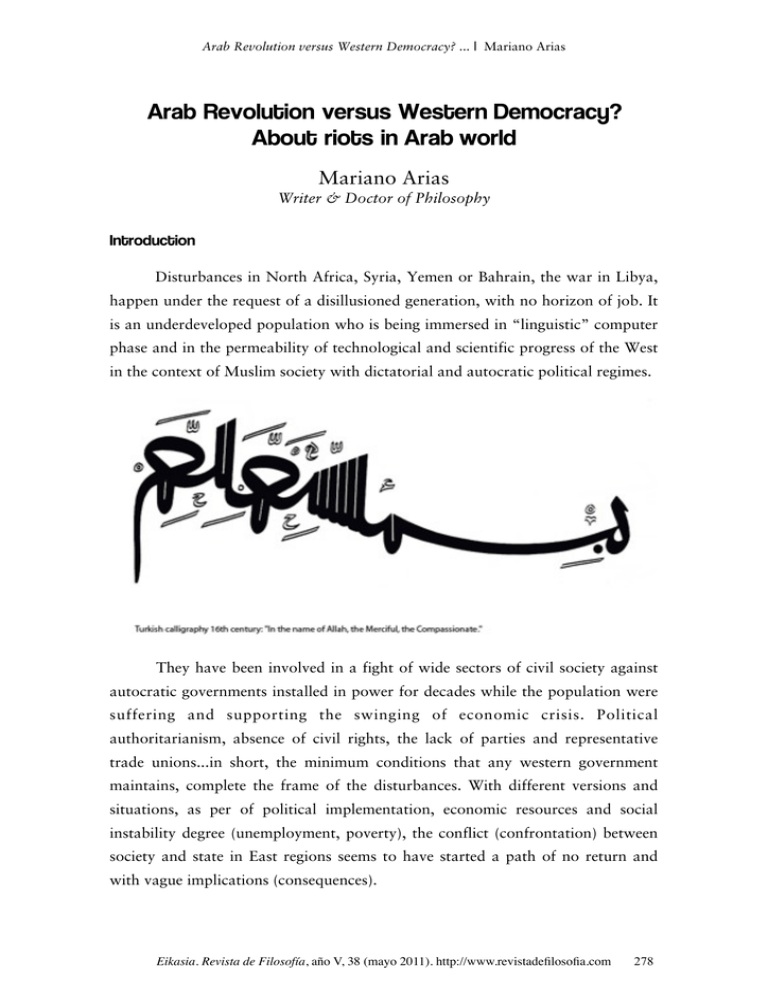
Arab Revolution versus Western Democracy? ... | Mariano Arias Arab Revolution versus Western Democracy? About riots in Arab world Mariano Arias Writer & Doctor of Philosophy Introduction Disturbances in North Africa, Syria, Yemen or Bahrain, the war in Libya, happen under the request of a disillusioned generation, with no horizon of job. It is an underdeveloped population who is being immersed in “linguistic” computer phase and in the permeability of technological and scientific progress of the West in the context of Muslim society with dictatorial and autocratic political regimes. They have been involved in a fight of wide sectors of civil society against autocratic governments installed in power for decades while the population were suffering and supporting the swinging of economic crisis. Political authoritarianism, absence of civil rights, the lack of parties and representative trade unions...in short, the minimum conditions that any western government maintains, complete the frame of the disturbances. With different versions and situations, as per of political implementation, economic resources and social instability degree (unemployment, poverty), the conflict (confrontation) between society and state in East regions seems to have started a path of no return and with vague implications (consequences). Eikasia. Revista de Filosofía, año V, 38 (mayo 2011). http://www.revistadefilosofia.com 278 Arab Revolution versus Western Democracy? ... | Mariano Arias The present study is just a reflection about the differences, insurmountable in many cases, between two cultural worlds whose “institutions” differ even dialectically. Symbolic institutions as monotheistic religion, symbolic institution “of the body” or “symbolic institutions of the tongue”, which is not merely a semiotic system, etc…we place them in this collection of differences. That is why the symbolic institutions that concern to the policy can be essentially disparate, although “formally” could resemble or run as desirable, and usually we refer to the terms we will use: democracy, human rights, etc… Because of that reasons, mainly, it is so complicate to analyze critically the established conflict in that societies without taking into account, ideological, religious and economic factors that underlie historically also in the different regions or states as in Western thought, since the seventh century until European colonization and the subsequent legacy of economic dependence, but also the affected institutions in their relationship with the Arab countries themselves. The impact of these ideologies, political subversion and affections, wars of conquest and philosophical Arab paradigms left to the history as poisoned legacy from the decolonization process. But also in that state of historical volatility, legacy has emerged (sometime infected) of mythologies, stories, ceremonies, images, with colonialist, imperialist and religious justifications etc…which have come to constitute the body of thoughts from different critical studies when it is necessary to analyze, argue and act. Does this mean that recent disturbances born, supposedly, from a western wedge, inserted in Islamism cave, radical Islam? Is possible to fall into these points of the ethnocentric or multicultural dialectic, even if the uncertainty of the process of “liberation” could be firm and the instability of the region and the Arabic countries do not have a consumption date. Occidentalism has been called into question over the last century and also orientalism has also caused no little controversy. However, we should review all the concepts. This is the aim of this article, elaborated along the lines of the rapid developments of the immediate present. And not forgetting mythological burden (load) of Arabic world, in their relationship with the west (and vice versa) to Eikasia. Revista de Filosofía, año V, 38 (mayo 2011). http://www.revistadefilosofia.com 279 Arab Revolution versus Western Democracy? ... | Mariano Arias establish a criteria where the riots are free of false o tendentious proclamations that are involved sometimes in ethnocentric or relativism positions. Such Occidentalism face up against to the space where it reaches the process of person and Arabic Muslim citizen: the Ummah makes sense, as we will see in the right moment, to the constitution of human being in Islam. That “other” Arabic could not be only just the mirror where is reflected the ideological "Judeo Christian” space, where we have been living as westerns. Moreover, the uniqueness of such a confrontation reveals the European thoughtless about the terms in the present Arabic conflict: institutionalization of democracy as “fundamentalist ideology”, the uniqueness of the state, the concepts of science, technique and politics, etc. The enumeration of these confronted concepts, as well as the absence of criticism from both the Eastern Arab world and the West are the axis around revolves the future of the conflict in the Arab world. Perhaps the “confluence” of normal events like the one which correspond to the ethical or moral issue, poverty (misery) or state tyranny left on the limit of this confluence. However, Western concepts seem to be enough to measure and interpret the Arabic reality. Problems of interpretation The difficulty (and diversity of arguments and theories discharged from the west and the Arabic world) to find solutions to a latent and entrenched conflict, as we suggested above, perhaps, it is, not because we have not the right intellectual tools to established criteria but because history of the Arabic countries is so embedded in western history as the concepts used in the relations of abstraction and analysis. Such issues demand an ideological, political and economic abstraction criteria to assimilate the facts in these first months of 2011, and even to get conclusions before a process of transition towards non autocratic regimes (from the Western point of view). As it has been established at Said’s critique, under the term “Orientalism”, it keeps in the West until presenting, a controversial vision of Arabic world, colonizing and inflexible, unyielding and vice versa. The view from the Arabic world from Europe and West tip up from the cultural disadvantage, scientific and mute progress until technological, researcher and intelectual dependence which Eikasia. Revista de Filosofía, año V, 38 (mayo 2011). http://www.revistadefilosofia.com 280 Arab Revolution versus Western Democracy? ... | Mariano Arias has become, in words of different Maghreb’s thinkers in a “schizophrenic” vision about themselves, in an impotence for building an identity. In a lot of articles, studies and reviews of different complexion from the disturbances in Tunisian still are keeping this pattern of thought. It is possible to put forward a comprehensive state of affairs, although is established a repertoire of approaches that would achieve certain criteria and conclusions capable of allowing a trial. 1. Western ethnocentric vision occupies several of the reflections in progress: the Muslin religious and ideological roots are being questioned by columnists and editorial betting for a democratic drift (of which we must exclude Herrero de Miñón article “The quality of the waves”. Sometimes it has focused analysis with a supposed breaking of Arab civil society and its approachment to European political and ideological principles –in short, democratic. Alan Badiou, from an extreme radicalism set out the universality of “communism in motion” (sic) as a result of disturbances and a design for a revolutionary future, perhaps throwing an uncomfortable but ineffable question: is Islam compatible with western world? This fact bring it up a enormous puzzles and problems that are not considered, as raised by this revolutionary universalism in the name of humanity, which we can say seriously, it does not exist. Sectors of the left in Spain keep similar devolutionary scheme speaking of peace and war as absolute terms, substantializes, at least questionable given under the urgency of an immediate peace to the conflict. Without falling into the Manichaeism, Robert Fisk’s position serves an example of the kind of vision. In our view distorted by ignoring that ethnocentrism is not a value judgment but a fact: it can not be possible to advocate in the Arab countries a change without having in mind an undeniable fact in the ideological economic, religious, and cultural distance, Muslim or Islamic. 2. Other positions contrast with Fisk’s ones. Without taking into account interculturalists positions of Bernard Lewis or Fuad Ajami (the first one, ideologue of military invasion in Iraq) we should consider the cultural breakage as the touchstone we need to resolve. Therefore it is difficult not to ponder Bernard Lewis’s analysis, if we contrast the objective difficulty of Islam renovation in its state religious structure. Neither the topics that European publishers refer, seems to carry out the requirement of objective argumentation Eikasia. Revista de Filosofía, año V, 38 (mayo 2011). http://www.revistadefilosofia.com 281 Arab Revolution versus Western Democracy? ... | Mariano Arias before the big (fracture, split) established between two cultures, as well as the confirmation of the Arabic political inequality, the absence of a stable political representation for the Arabs and the violent representation of Muslim dictatorships, in that of political and economic interests are not homogeneous, as it is not the society, whose rebel against dictatorship ruling: Tunisia, Libya, Egypt, Syria, Jordan, Bahrain, etc. If it is possible to find a common (general) reason, it is also logical and necessary to point out that the disturbances are not spontaneous but massive, autonomous, and where a large sector of the population, mostly young, without a clear intellectual and political awareness, have reached a higher degrees of rebellion and protest against the bloody and dictatorial oppression of autocrats. That individual consciousness, in some cases collectively, may be conducted or promoted by a group or political party, not exclude that in the Arab political landscape, claim rights may have a reflection in the political and trade union organizations. It is possible to find the obvious danger that Islamist groups may be erected in forces able to impose their theocratic principles. The history of the Arab countries since decolonization in the sixties and seventies allow us to think of such an output. Joseph M. Cachia on “Whither Now Egypt” (Palestinnechronicle.com, April 26, 2011) express the concern of fate in the Egyptian revolt to the pressure of American power, fearful of the “independence” of the people, from “secular nationalism” or a drift that leads to an intransigent Iran. Is the installation of a real democracy can break ties with the West so concerned? 3. Intellectual and active division from a so called left have not been able to interpret in a fair extend the disturbances. We could ascribe this kind of left positions to a politic vision, with the entire thing the concept involve: ideology, ideological commitment, etc. Neither Il Manifesto group (divided) in Italy, Giuliana Sgrena specially, neither the European nor Latin American left have found a point of agreement in the analysis of revolutionary Arab phenomenon. Perhaps the anti capitalist radical left or anarchist has responded (react) in a more homogeneous way, although without the enough strength and keeping the principle of imperialist criticism, without exceed the political Manichaeism. Mario Sei’s analysis (“Mirar desde la izquierda las revueltas árabes”, Rebelión, 18-III-2011) rightly puts in context this division inside the left about the imposition of neoliberalism. Znet has published the Interview to Gilbert Achcar (20th march 2011), one of the representatives best known on the left, who Eikasia. Revista de Filosofía, año V, 38 (mayo 2011). http://www.revistadefilosofia.com 282 Arab Revolution versus Western Democracy? ... | Mariano Arias maintain a position akin tot he resolution nº 1973 from United Nations but still remains critical with the results over the civil population and defends the position of support tot he “rebels” because it means the “ Libyan democratic revolt”. 4. Other positions seem to lean to an ethnocentrism gaping towards a cultural harmonious, or trying to be more precise, an ethical universalism. It is now time to analyze the fracture and the Arab revolt as a territorial, geographical, cultural, religious and political space, considering the ethic option of the individual, who is universal, as the acceptable position to get a solution tot he conflict. It is the UN position. It is the position of the UN, with glimpses of a pure enlightened thought can be found in European intellectual circles centered at the bottom of controversy between moderates, radicals and harmonic (universities, forums, lobbying, Arabic-Spanish Foundations, etc. .) Again the position of Gema Martin Munoz (webislam February 2011) moves away from the kind of analysis more accurate and constructive East-West relations: its position harmonist tries to ignore the difference between the two major monotheistic religions without considering religious differences between Christianity and Muslims, and without noticing the huge gap between the two gods (Allah and the Holy Trinity) as well as religious overlap at all forced, it must be said, in the United Muslims (believers and disbelievers, etc.). And although such disdain religious significance in the backdrop of the riots. Luz Gomez Garcia ("Seven Keys to the Arab awakening", El País, April 15, 2011) is in orbit jubilant awakening of the Arab world at last stands against the democratic European power "embedded in a depauperante and neoliberalism growing democratic deficit "exercising their uprising against autocracy the" demands of pluralism and freedom. " Harmonic analysis supported the importance of increased rate of Muslims in Europe, which does not hide weak analysis of the complex background of the riots. Kristina Kausch ("Myths of the revolution and scenarios in the Middle East", Foreign Policy, No. 140, 2011) researcher at the Foundation for International Relations and Foreign Dialogue examines the causes and dangers of the Arab uprising. Unlike Gomez Garcia notes the danger of a final settlement of their claims: "Given the institutional weaknesses in all Arab countries, none of them will be trained following a popular revolution to replace the unit immediately the old regime. Agreements between different social groups will be essential to advance the transition peacefully and constructively. This situation carries the risk that once diminished international attention after the Eikasia. Revista de Filosofía, año V, 38 (mayo 2011). http://www.revistadefilosofia.com 283 Arab Revolution versus Western Democracy? ... | Mariano Arias Revolution, the old guard to regain its power through the back door. " Federico Mayor Zaragoza in “No son balas lo que necesitan (http:// federicomayor.blogspot.com), although with other different argument than the islamophobic ingenuity of Gomez Garcia, but with the same reference mirror, leads to term an analyse with the ideological background of an ethical humanism, betting for a peaceful intervention, understanding the root of the problem as a result of the disunity of European countries and the eagerness for arms spending. In short, he says. “What the west needs now is a very quick review of military arsenal, most of them crowded from military artefacts from past wars; the ultimate destruction of nuclear warheads, the rapid growth of sustainable energy sources to moderate consumption and the power of oil; a strong UN ready to take part quickly in unacceptable eases of violence and extremism; global co ordinations of all technological and personal resources to deal with natural disaster or caused by men”. Perhaps these words may be accepted by a broad range of ideological positions, but the problems are not in this type of abstract request or analysis. In this order of questions is where another view, no stranger to the position discussed above appears (and not just theoretical but practical) of how to resolve the mismatch between East and West: we mean to the word “dialogue” (magic for some people). To this vision referred the Spanish Arabism Serafin Fanjul (“El integrismo islámico. Las formas actuales.” La ilustración liberal, nº 23, abril 2005) critically, appealing to a facts hard to argue: “In the last years, inside and outside Spain, it has become fashion a magic world: “dialogue”. All in Europe join this word because, otherwise, out of doors, they are condemning themselves morally. But in Islamic fundamentalist circles –apart from mere concessions to west press, persuaded by the kindness of their cause, they do not have to hide and refuse the dialogue between cultures and religions, because that would be neglecting the incompatibility between western though and Islamic spirit. The possibilities of a real dialogue between East and West are minimal and the Muslim fundamentalists have no problem declaring in pamphlets wide disseminated: “A dialogue whose aims is the approachment between Islam, Christianity and Judaism can only be achieve at the expenses of Islam, because it is the only fair religion, while the others is false. The approach would mean to renounce to this requirement. Which would entail the Eikasia. Revista de Filosofía, año V, 38 (mayo 2011). http://www.revistadefilosofia.com 284 Arab Revolution versus Western Democracy? ... | Mariano Arias greatest harm to Islam'(quoted by Tibi). " Logical-sociological questions The difficulty, expressed as we have seen in contradictory, confuses, if it arises from the request of abstraction, a logical way to be outside from subjective conditions, western models an ideological paradigms. We suggest, in line with these arguments, some points that will allow establishing a way for an appropriate analyses and a vision as much objective as possible. a) It is possible to draw from Islamic Arabic riots a non Islamic identity, an idea (not an ideology) distinguished of the intrinsic equation of religion-state? A difference between the Islamic moderate model and a democratic govern? Moreover, does Islamism question the integrity of Muslim Quranic doctrine of Muslim Ummah? It is possible to talk about a state where the imposed order is structured, depending the regions, in a tribal regime without hiding (disguising) a dictatorial or absolutist rule (reign)? The question raised as follow is subtle and not exempt of dangerous simplifications. The underlying concepts in the questions above (in the previous concepts) are manifested as the same time in the concepts that west has defined and established over a long history: freedom, democracy, secularism, religion, participation, revolution. Even like that, his strength of spirit should not be view exclusively from a western point of view (from European vision). In the West, the representative democratic institutions are established (with different inequality parameters between them) from centuries and had emerged from wars, nationalism and from the enlightened revolution that started the fortitude between church and state and established the primacy of reason as a source of inspiration of individual and society. One idea, democracy with reaches the definition given by Aristotle (Politica 1317a), to its essence or definition, when it point out various modes (ways): “There are two reasons for democracies are more; in first ...that people are different (one in an agricultural village, other a craftsman village, or labourers one, and if the first is added to the second, or the third to the other two, the democracy is different because it make it better or worst, but because stop being the same”. Eikasia. Revista de Filosofía, año V, 38 (mayo 2011). http://www.revistadefilosofia.com 285 Arab Revolution versus Western Democracy? ... | Mariano Arias The translation to the Arab world to this block of ideas and concepts can’t stop observing how they are interpreted, but practiced, in the same implosion in the Maghreb revolts and the rest of Arabic countries. As we can also forget, the very reflexivity way to certain western concepts and ideas, attached to a growing substantiality mythology. We agree that democracy it is not an absolute concept, a fixed idea, and unambiguous, decipherable by itself (as we have emphasized in the case of Aristotle). We could say that it is an idea fixed to different variables even in the western states. It is not possible, in our view, to speak about a perfect democracy (as a standard template) without falling into a neither democratic fundamentalism nor freedom; in Maghreb, Syria, Egypt uprisings, where this product-ideas has been present along the colonization process, Arabic nationalist and socialist positions at the end of real independence of Arabic countries. Therefore, what is the idea of democracy, even freedom, a constant in the uprising of the North African countries? What is the democracy that from Europe is postulated to assume the Arab state? We rush to point out that no Arabic country, none, can be considered as a democratic regime and free country, at least from western ideological parameters. And the idea of democracy, declared in Tunisian, Syrian, Libyan and Egyptian uprising (revolts), has the western original reference, with a highly ideological confusion and with different points of view exercised even by those who hold ideological fundamentalist democratic positions. b) Discussions of previous concepts, concern indeed to the central key of Arabic society, the internal problems of its unique tribal structure, diverse, different between Arabic people. A democracy that without reaching the western pessimism shows the weak of both, Arab states and civil society: the combination of fundamentalist class interest, Islamists, with factual power from external and internal market; a foreign policy that until the moment has not been put on trial the position. The position of an education based en Quran principles; and finally, the internal pressure between features (in this case parties), separable between reformist or moderate Islam and a fundamentalism Islam as the Muslim Brotherhood, similar to Hezbollah or Hamas. Without putting aside the army, as a guarantor power of the state institution, te islamist belief and its claims, suggest that, in our point of view, the dificulties of arabic society or the tribal in Lybia to assume that idea of western democracy. The segregation by sexs, the inferior Eikasia. Revista de Filosofía, año V, 38 (mayo 2011). http://www.revistadefilosofia.com 286 Arab Revolution versus Western Democracy? ... | Mariano Arias position of women rights in the family and social status, the same teocratic conception, the religious authority of the iman and, ultimately, the clash between Islamic law and the western moral and ethic. Participation of islamist in arabic society is sufficiently established, implemented and unquestioned as a social force (20% of the votes in rigged elections) allow us to put on hold the intend democratic desire of the egiptian people, for example, expressed during the days of occupation of the Tahrik square in Cairo. c) Why we should consider then that a harmonious vision eludes the objective of Arabic world? Not because of ideological questions, socialist or popular or because of political prejudice or question that may affect to the cultural and economic relations between west and east. Maybe because the cultural relativism and the ethnocentrism have been built in an ideological or sociological nebula to stamp the disagreement between two societies, but because the unequal character (temperament), internally faced between two civilizations from the historical construction process of both societies, has imposed two opposing conflicts in life, consciousness, worldwide, religious and civil faced since the beginning and under different formats, consolidated.... involution or evolution in the different countries, from birth. The questions cannot be raised, in our view, in exclusively terms. Islam creates the individual, built his individual ethos, personal (although not exclusively) as a “structuring agent” (if we follow thinkers as Abderrahmán Mohamed Maanán o the Tunisian Moncef Chelli). The borderline between fundamentalism Islam and other called “moderate”, can not hide the base of that ethos, as it is expressed by Mohamed Maanán (“El Islam ante el future”, www.identidadandaluza.wordpress.com, 4 de febrero de 2011) that says, inspired in Chelli: “Islam shapes relation with the environment and with oneself, further away from optional (…). Islam is the reign of Muslims, the place where the Muslim can be free and creative, and out of it; he lost completely the sense of himself”. Islam will no longer be the builder of that territory as individual or people, but as undeniable place and just to extend that it forms the language itself for the Muslim, without option because the own option have kept (left out) from all the ideological western content. Eikasia. Revista de Filosofía, año V, 38 (mayo 2011). http://www.revistadefilosofia.com 287 Arab Revolution versus Western Democracy? ... | Mariano Arias In independent Algeria, Ben Bella defined in the Islamic Council Conference de 1985, the main principles that supported the spirit what reason both the fight for independence from France as well as consolidating the established regime: Islam is the one which regulates, encourages and motivates such impulse, the one that bring together the power of truth which regulates la ethic and moral conduct. It was expressed like that: “In this fertile land, sink the anchors our deep motivations, our latencies. It is our sanctuary. When we must realize a capital gesture, a supreme effort, when the wall of our certainties fall into pieces and the knock rain down on us and our deepest being is threatened, then we turns to that sanctuary in which we search refuge and encouragement to continue with strength our combat. Critical questions From our point of view, the parts from which are built the new revolutionary order in the Arab countries, concerning to a various areas that affect the different layers of the structure of society. 1) Religious order: Islamic monotheism is separable from Christian monotheism. Although its origin is referred to the Semitic religious world, it has a It has a substantial component from Greek-Aristotelic philosophy, whose difference is equal from Judaism and Christianity of Hellenistic root. The ethical and moral component will be at the beginning over the established political order, the tribal grouping and the expansion of truth revealed to Muhammed as it is arranged in Quran (the two originated medieval branches, Sunni and Shia are differentiated more by its origins that because of its dependence to the purposes and objectives described by Islamic orthodoxy. A study made by the writer Tahar ben Jelloun, Islam explained to childrens (2002) is created with the intention of making available the thinking of the Quran (and Sharia by extension) and update the legacy of Muhammed. Ben Jelloun, francophone born in Fez, Morocco, has got a different vision to the relations between East-West. However, the reference book keeps that religious principle that, in our opinion, hides one of the variables of the imbalance Muslim islamic-politic: the religious sense keeps intact even if the effort of renewing from the author try to dissolve (update, evolve in their words) the root itself of Quranic religion. Perhaps this solution is impossible without destroying the very meaning of the religion. Eikasia. Revista de Filosofía, año V, 38 (mayo 2011). http://www.revistadefilosofia.com 288 Arab Revolution versus Western Democracy? ... | Mariano Arias Several factors have contributed to this order, also political as religious (and a paradigmatic example could be the position of Ben Bells). The strength of Muslim religion has been built under ethic and politic pressure from holy book Qumran (compendium of behaviour and moral), Sharia (laws in Arabic space) and the Ummah with Sunna, which is the future for a people which evolution it is historically defined in economic and politic substratum’s of difficult retreat between the Arabic countries as well as with the relations between them and west. Ummah is currently pervaded (imbued) with the disparity of Arabic positions and identity crises. The holy book of Qumran, the letter-spelling and writing, its aniconic, underlie intellectual and religiously in the believer individual with a strength bigger than the belief in Bible: until the present as holy book, it becomes an obstacle in the prevalence of logos and has prevent to established the domain of reason and secularism to get (reach) a phase that we could call Illustrated or Arabic Renaissance. This framework of “identity- is trying to keep out of any other reprocess in which citizens or individuals, or even tribal regimes (systems) fight or struggle against the corrupt governments in the name of freedom. For other point of view or perspective, it can be interpreted as institutional weakness, which all the Arabic countries are forced. Item. Quram is a compendium or summary historically closed, whose hermeneutics, beside Sunna, hold back all the possible adjustment to the rest of social, political and cultural components to which is subjected to greater or lesser extend (degree), a civilization. We have seen it before (previously) with the analysis of Tahar ben Jelloun’s study. Even appealing to the myth of three cultures, in coexistence (coexisting) in Medieval Spain and to the religious freedom, Qumran resist (hold out against) an analysis about its current rationalist validity (relevance) (and not only because the resistance of the Islamic legislation to the democracy concept); in other hand, to our point of view, it is an obstacle to the democratic progress. Even ones own language (spoken and written) it is submitted to the influence of productive and philosophical stagnation as well as the regulation, expansion, training and discussion in the area of the critical thinking, but not in other areas (as it well known in the poetical-literally order has been very productive in the East history). The controversies of recent years about the Greek influence on Arab thought in the High Middle Age, consider exactly the consequences to the previous assertion, as well as the appropriate identity of the Muslim sphere unaware, in its root, to the European thought (we Eikasia. Revista de Filosofía, año V, 38 (mayo 2011). http://www.revistadefilosofia.com 289 Arab Revolution versus Western Democracy? ... | Mariano Arias can remember here that the doctrine book from Aristotle’s were no translated to the Arabic language because of its conflict with Quran. Sylvain Guggenheim’s thesis can reinforce what have been said until now (Aristotle and the Islam, 2008, p.74) and proof the established state of things until present: “When we talk about “Arabic Muslim cultures in VII to X centuries, we make an anachronism –or to resort to a trick- because in that moment, that culture no sooner were Muslim and there were Arabic just in a indirect way. Actually, it was greatly Christian and syriaca. Perhaps because they cannot assimilate the different variables that in the course of history, built the conception of Arabic world, the controversy between the Western-Greek thought and the reflexive Arabic world have established (marked) the rational distance which divides them. Gouguenheim would express it in these terms: “The two civilizations, ancient Greek and classical Islam, did not mix between them…In short, in Middle Ages, Islam was not Hellenized, in the same way that West was not Islamized” (op. cit., p. 147). The demystification came to establish this assertion: "For over three centuries between the VII and X, therefore, the 'Arab-Islamic science' of Dar al-Islam was actually a science Greek for its content and inspiration, and Syriac, then Arabic, because of their language. The conclusion is clear: the Muslim East it owns a great debt with Christian East. And it is this debt that we often overlook, both in the Muslim world and the western "(p. 90). 2) The cultural, linguistic and scriptural order isolates two civilizations: Allah it is not the Catholic God; Arabic language is not the western romance (nor Latin or Greek). The curb to the innovation, to the critic rationalism, to the powder of word and dialectics was cut off from the madrasas regulation, when it was imposed the religious orthodoxy at various stages of Middle Ages and the freely intellectual regulation was prevented. The issue was serious because we have to emphasize the efforts from Muslim intellectuals, particularly in French, British and American universities because they perceived /sensed in Quran and Islamic law the main sources to resolve the conflict between reason (ijtihad) and the doctrinal principles of Islam. The desire to return to the medieval Arabic “reason” whose prevail the mathematic and philosophic progress, as they said, it is considered as the storyline to guide the current rational renewal to the scientific principles of the Islam thought has been subsumed. Difficult task when Quran and Islamic law are closed corpus in which Eikasia. Revista de Filosofía, año V, 38 (mayo 2011). http://www.revistadefilosofia.com 290 Arab Revolution versus Western Democracy? ... | Mariano Arias adaptation or reinterpretation to new times require an intellectual effort whose only way out, in our view, is to dissolve the Islam and outshine Quran to what this entails: to recognize the moral and scientific doctrine detached/getting rid from historical norms and Historical Islamists conceptions as outdated in front of the mirror of technological, political and ideological Western advance, which is found as a reference. In other words, go beyond the letter of the texts to find the spirit of it and overcome it, but it is extremely complex and difficult to take on (assume) by the Ummah and Arab society. An example of this desire we can find it in the provoking article by Fatima Agha Al-Hayani, “Islam and Science. Contradiction or Corcondance”, published in Chicago Zygon (vol. 40, N. 3, September 2005). Fatima defends critical spirit, for this ijtihad which is calling for a role of both the imam and intellectuals to serve the renewal of humanity. Even so, and underlying the previous arguments that describe this situation well, we can note some information. Regarding to the intellectual speculation tool, we can refer some relevant characteristic: the language and the development of alphabetic writing, although its Semitic and Nabatean origin have been differentiated from the Phoenician and Greek alphabet (availed in our doctoral thesis “The Sacred Scrib. Anthropology materialism is the origin of writing”, 2009). A series of current information, result of the linguistic historical root mentioned, allow us to clarify the seriousness of the facts to which we refer. In 1996 were published nearly 2000 books, representing 0.8% of the global publishing industry. However, Arabic language is the mother tongue of more than 300 million people. We report the analysis made by Fathi Khalil al-Biss, vice president of Arab Publisher Union, who make in the AHDR 2003: “The Arabic books publishing is in crises. It decreases the number of new publications and also the copies, reaching in some cases a few hundred readers. The big publishing companies have stopped publishing serious scientific and cultural books with quality that can contribute for the advancement of knowledge and its dissemination. 3) Productive development in Arabic countries is 10% of all West Europe. The poverty rate is shooting up. The cultural development is getting the minimum limits assimilated from West. As a result of the two preceding epigraphs, the Eikasia. Revista de Filosofía, año V, 38 (mayo 2011). http://www.revistadefilosofia.com 291 Arab Revolution versus Western Democracy? ... | Mariano Arias economic and social development has prevented to place Arabic societies in a higher level from European Middle Age until XXI century. According to the recent studies, demographic rate in conflict Arabic areas will shoot up in the next two decades. To this data we must add the rise of the prices of sugar, cereals, seeds; the falling output in Easter Europe, as it is the case of Russia, which has affected in the countries of North Africa. These facts together with the sharp rise of duties, are affecting specially to the third world countries and Africa particularly. Such a verifiable fact remains largely as an aggravating to establish a gradual policy of coexistence in the Mediterranean geography. Such a situation must not ignore the decadence of economic and politic power of European countries in the rest of the world. European organizations choose a future, where the decision centre will suffer a Code-switching in the domain centres. Such interpretations rest on the central question of the balance of civilizations, more specifically, western or European and the Arabic, that will suffer the decline remembering us, with all the corrections and appropriate precautions, the studies of Sprengler, Barzum or Toynbee, in his analyses about the western decadence. Therefore, the possible power or universal organization will be difficulty assumed by the fragmented Europe, as we noted above, and less possible the UN, as a corps called Europe which is a “biocenosis” of states with different interest. In the other side of Mediterranean, the Arabic countries develop into a cyst of centuries of struggle and economic and politic backwardness (without expressing any kind of ethnocentrism or relativism) complicating more the future, especially when such a information is intensify in the immigration to European countries, triggering the multiculturalism heat, with the danger of political ideologues and demagogues can assume a difficult integration, difficult to solve in its root 4) Western technological progress has affected to the Arabic countries as a mask and means to establish a wedge between the aspirations of dignity and a way of leaving poverty in Arabic world. The ideas of democracy, equality and reason, are suitable of west since the Enlightenment (placing the revolutionary act in a particular historical moment). Must be accommodated in Arabic world and be contrasted with Quran principles to be able to build an operatic functional model. The risk of that bet is very obvious. It is very risky historically and philosophically to admit the idea of democracy as absolute, close and defined. Eikasia. Revista de Filosofía, año V, 38 (mayo 2011). http://www.revistadefilosofia.com 292 Arab Revolution versus Western Democracy? ... | Mariano Arias The inclusion of this confusing, chaotic, uneven and ambiguous idea (no matter how it remains in some of its components: free choice of political parties, taking on the power by election, dissolution of the authoritarian monarchy) in the Arabic societies must be reconstructed (rebuilt) in full view of three first sections or paragraphs. No few writers who have not yet discussed the idea of democracy, unravelling mythology. Lebanese writer, Amin Maalouf says (Efe, Ecodiario, 02/10/2009). “Human rights must be equals. There are no territories (areas) that deserve democracy and others do not deserve” (...) [there is no] “impervious to democratic regimes”. He underlines the sentence, declaring that “democracy itself is exported. It is an important export product. There is no need to export democracy by force, but with respect and dignity to another’s, and not with armies of occupation. Mohammed Amayra, from the Jordan daily Al Ray, expresses the distrust of the Arab countries and their governments establishing democratic institutions. “Society does not trust of Western Europe and United States, entities that have left a bad legacy after so many years of colonialism and military, economic and politic rules that still continue in Lebanon, Syria and Palestine. But the danger of Islamist lost of sense is found in the riots. Gustavo de Aristegui underscores this danger (Club Internacional de Prensa, Madrid (15 de abril de 2011): “None of the revolutions has been planned for them. But once it started the riots, they have played a role in the organization (...). The demands of complains has been to tell the world: I want to be Arab, Muslim, citizen, free and democrat. And none of this is incompatible (is not held)”. And this acknowledges that “Islamism as ideology it is compatible with capitalism, but the Quran itself consecrates private property”. In the framework of these positions, with regard within reach of riots and Islamist position, Gustavo Bueno (“La obsesión de la Yihad”, El Catoblepas, nº 49-3-2006) warn us about the danger of Islamist: “¿Did the muslim jihadists, if remains so, could they stop fighting, even if they did not reach the social welfare state, integrating in the global society, in peaceful coexistence with other religions and cultures? Does it make sense even the term “democratic Islam”, to the way of parliamentary democracies of western capitalism, if Islam keep (maintains) its dogmatic principles of Quran, or almost dogmatic (quasi dogmatic) from Sharia, that is, it they remain true to themselves?” To add below: “Islamism, if remains true to itself, it is insoluble in holy water of Christianity, whom they have Eikasia. Revista de Filosofía, año V, 38 (mayo 2011). http://www.revistadefilosofia.com 293 Arab Revolution versus Western Democracy? ... | Mariano Arias considered blasphemer and precisely because of its fundamental dogma: incarnation and Corpus Christi dome”. June 2010 polls, develop by Pew Research Centre (even the so called “Wikileaks Papers” about the Egyptian situation and the democracy, and as far as the insubstantial democratic consciousness of the Arabic countries is concerned) are eloquent: near to the 90% of Egyptian Muslims are in favour of Sharia application, stoning or death penalty by religious conversion. In the rest of the countries, with their particular characteristics, the strength of Islamism or the moderate Muslims with no western democratic experience, are moving between non union trade organizations or minority leftist forces (the Patriotic and Democratic Labour Party in Tunisia and the Socialist Renewal Current in Egypt. Slavoj Zizek in The Guardian (1 February 2011) is an example of this vibrant discussion about the importance of fundamentalism in the riots. For Žižek, the hypocrisy (double-dealing) of western liberals has not the same yardstick about the support for democracies en Arabic countries. However, the importance of Žižek's argument is vested in not questioning the importance and strength of Islamic fundamentalism in the riots. That is the extreme that seems to cloud western and Arabic intellectuals. Final Coda It is precisely in this dialectic between East and West, and in the own contradictions of European governs (France, England and Germany) where it is possible to emphasize the different options, interpreting or decisions made by the intellectual elites, states and organizations, as well as political parties (where they have a stable presence). Since the “clash of civilizations”, proposed by Samuel P. Huntington to the “alliance of civilizations” conceived by the Socialist Government of Spain and undersigned by various European and American governments, in still evidence of what has been called “real politik” and the volatile confluence of the second option with the unavoidable globalization and economic interdependence of the first and third world countries. The European states and United Nations particularly make up a vast territory unaware of political unit, and the decisions making before the rebellions of the people against the dictators. The decision of United Nations for military interventions in the Libyan military conflict, are room of different opinions, but especially still over fly the exerted idea of “clash of civilizations” even though this idea can be Eikasia. Revista de Filosofía, año V, 38 (mayo 2011). http://www.revistadefilosofia.com 294 Arab Revolution versus Western Democracy? ... | Mariano Arias considered from an ethnocentric point of view. However, we should remember that, in view of the received critics by United Nations by the “lack of reflexes”, disunity, “operational failure”, etc, de facto, United Nations is a group of states with different interests between them and regarding Arabic states, even if they prevail in the two regulatory principles: the respect for human rights and military intervention in extreme cases of genocide on population. Taking a decision in view of the serious events, should not cause confusion, unless if it does not understand properly the origin and function of United Nations and we could think in a metaphysical capacity of joint decision. If we apply the pragmatic criteria of “real politik” and not the belief of a nebula or sky ideas, there is no middle terms, or considering naively the United Nations action (under Order No. 1973) of neither “weakness” nor possible establishment of a “protectorate” as it is proposed by a sector of the Spanish Left. A more balanced analysis would bear in mind the evidence of a western ethnocentrism (represented by Human Rights Letter and a capitalist system de facto) of a democracy (perhaps exerting democratic fundamentalism we have referred), a critic multiculturalism... and a genocide which is skiing from European institutions, firmness and unity, without prejudice of demanding a ideological criticism beyond an Arabic identity, still confusing and “schizophrenic”. We see no need to recall the historically events which have led the construction of Europe in relation with Arabic world, aside from all listed in previous sections. In his article “Arabic Society and Schizophrenia” Abd Al Khlaed Husein, Iraqi reformism, emphasize, in the points with other Tunisians, Moroccans and Algerians thinkers, the ideological, political and cultural grown apart, embedded in Arabic world. Briefly noted above, ideological and religious dissociation (underlie) are behind the destabilization of the Arabic peoples. Although at this point we should make some clarifications. Criticism to the Letter and Declarations of Human Rights is consolidated in western civilization, not in the historic cycle of Arab East, born from a military confrontation in Second World War and with an articulated of ethic and moral ascription rather than political or legal, which would be later or subsequent to the applications of the states (in its constitutional foundation, legal, etc.). Such a Declaration, without prejudice of its critical importance in contemporary world, is strongly provided criteria by the conditions that allowed its firm and the confrontation Eikasia. Revista de Filosofía, año V, 38 (mayo 2011). http://www.revistadefilosofia.com 295 Arab Revolution versus Western Democracy? ... | Mariano Arias (clash) of the consolidated powers in the late forties. If we can consider it as a closed policy, this would be like admitting, without rhetoric, the “end of the history”, bordering pure speculations (perhaps it is necessary to remember that neither Soviet Union, nor China or the satellite countries approved in that time; as Saudi Arabia was disagree with the concept of human equality between genders. Ben Jelloun underlines (“El Cultural”, en El Mundo, 6 de mayo de 2011) how “the last events show the desperation of our people”. Human rights have no price, but it seems the rest of the world was alien to our problems. Thanks to internet, nobody can say he does not know what is happening in the Mediterranean, nobody can look away with impunity”. The reflection of cultural and social differences what we can see in this work, is exposed in this type of analysis. It is not the West differences to the Arabic world which gives character (temperament) as the intrinsic difference and conflicting to the Arabic world towards the West. We refer to a schizophrenia that the own Arabic intellectual says, and the collision (crash) between European “Human Rights” and the statement of “Islam Human Rights” adopted in Cairo in 1990. Perhaps this dialectic, not only presented by Ben Jelloun, but for other intellectuals settled in Europe time ago. This has to do with the objective deformations of the intercultural and multicultural analysis and the religious and politic idiosyncrasies of the Arabic and Muslim thought. Of course, part of Western prosperity, its implementation as privileged model in the world has been sustained, settled, established and asserted in political and economic confrontation with the Arab countries (in different degrees and times) and not only in the Arab- Christian confrontation. That struggle, that domain is at the base of social and economic enjoyment established by the welfare state. The democratic system in the West assumes, with no hint to deliver an opinion of value but in fact the historical and institutional Arabic malaise. Without the Western democratic process has meant the promotion and maintenance of democratic Arab regimes. This issue, key to understanding the revolutions in the Easter Arab come shake off one’s unease whose resultsare the business of the sequence of cycles studied in 2005 by Henri E. Hale, changes in the regime of liberalization of the system and political repression for another cycle. The response of the riots affect Eikasia. Revista de Filosofía, año V, 38 (mayo 2011). http://www.revistadefilosofia.com 296 Arab Revolution versus Western Democracy? ... | Mariano Arias a process where we can weight up the depth of the changes, if these cycles, reductionist, remain, in our view, the dynamic of stability may gives a new line rupture. That is the challenge that now lives in Tunisia, Egypt, Libya, Syria, Yemen and with the absence (logic, as we have noted) of political organizations, parties or structured groups able to present an effective response to repression of dictatorships and autocracies. More precisely, overcome the group in fusion of the first riots to institutions that would consolidate organically the first manifestations organically and not to break the desired inertia is so difficult. Islam in its various forms is entrenched in companies whose majority is Sunni, in broad sectors of the civilian population. Excluding a minority of the middle classes, the rural population has no ideological consciousness beyond their poverty, enthusiasm for change and dictatorial suffering. To reach a new stadium from the bloody riots that started in February 2011 and we can not see an expiration date, the factional islamist struggle, fundamentalists and organized parties with different social base have a delicate challenge, long in time and also difficult to consummate. Challenge that maybe is related with the claimed Western social and political stability, whoch glance to the Arab world has a replica in a combination of democratic ideas difficult to implement in societies marked, as we have seen, by political and religios construction so entrenched historically. Perhaps it would be interesting, in reference to all the things we have said until the present, consider the historiography, cults and religion demystification in the relations Arabic-Western. Of course, the discussion is already open for decades, and in each historic phase appear again the legitimacy of Islam as an insurmountable society, permeable or impermeable to scientific, social and political advances imposed from European Western civilization. The strong thesis we present here, as a final coda, will be among the paralyses of political solutions in the Arabic countries (depending the country we are talking about) and the historical primacy of western thought and language, impregnating relevant aspects of the Muslim Arabic culture. Otherwise, no one can understand the expectation of the Arabic riots without a Western European Perspective. In other words, the relationship between the two civilizations seems to us today, not that much as conflicting in a short term, but revolutionary and conditioned (determined) to the stability only with the western participation, Eikasia. Revista de Filosofía, año V, 38 (mayo 2011). http://www.revistadefilosofia.com 297 Arab Revolution versus Western Democracy? ... | Mariano Arias which this entail, the destabilization of the order of thought and Arabic political action. But perhaps also in our order, the Western and Christian, and its postdemocracy. Eikasia. Revista de Filosofía, año V, 38 (mayo 2011). http://www.revistadefilosofia.com 298
